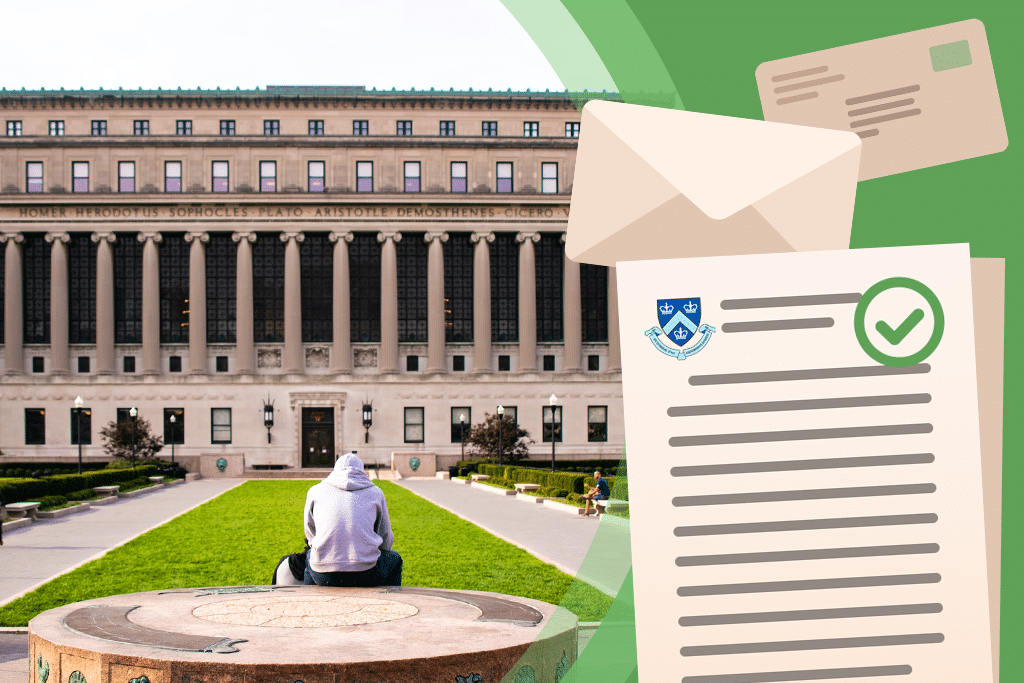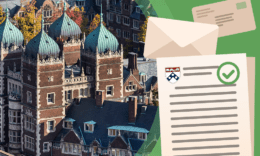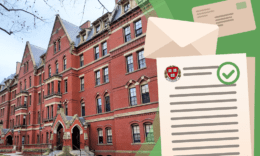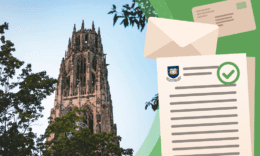Columbia University is located in the Morningside Heights neighborhood of Manhattan, one of the five boroughs of New York City. Columbia’s diverse student community represents over 100 different countries and was once home to famous alumni such as Barack Obama, Warren Buffett, Langston Hughes, and Amelia Earhart.

This post will break down Columbia’s application requirements to help you perfect your Columbia application.
Columbia University Statistics
Rankings & Enrollment
With a 3.73% acceptance rate, it is clear that the Columbia University experience is one of the most sought after. U.S. News and World Report ranked Columbia at #18 in 2023 after placing Columbia in the #2 spot in 2022. This change in rankings casts doubt on both Columbia’s honesty to the U.S. News and World Report and the methods U.S. News and World Report uses to calculate rankings.
Columbia enrolls roughly 10,000 undergraduates and 25,000 graduate students. Columbia’s undergraduate program consists of Columbia College, the Fu Foundation School, and General Studies. Columbia College (4,955 students), also known as CC, is a liberal arts college. The Fu Foundation School is the School of Engineering and Applied Science, also known as SEAS (1,843 students). General Studies is Columbia’s liberal arts school for non-traditional students (2,941 students).
SAT and ACT
For first-year and transfer applicants to CC and SEAS, Columbia is maintaining a test-optional policy. Previously, Columbia has required scores from either the SAT or the ACT, but no requirement for the writing section. For both the SAT and the ACT, Columbia superscores. This means that they consider only your best score on an individual section—even if your best scores occurred in different sections over multiple test-taking sessions.
Among admitted applicants to Columbia, SAT Math scores average 770, SAT Reading and Writing average 735, and the composite scores average 1505. ACT scores average 34. As a result, you should submit scores even though they are still optional, as long as your scores are near, equivalent to, or above the average of admitted applicants.
GPA
The average Columbia admit has a weighted GPA of 4.13 and a 3.91 unweighted GPA. You need to demonstrate a strong high school academic record to achieve acceptance to Columbia, ideally taking multiple advanced courses to weight your GPA.
Tuition and Financial Aid
Columbia University fees add up to $85,967 per year. But 49% of students receive financial aid, with the average financial aid offer being $63,971. Columbia is need-blind for non-international students and need-aware for international students. That said, Columbia is committed to meeting the demonstrated financial need of admitted international students who have applied for financial aid.

What Is Columbia University Looking For?
The High School Experience: Expectations
To apply to CC or SEAS, Columbia requires that high school students meet their high school’s graduation requirements. This holds up even if you are a junior (in which case you you must specify that they are applying for early admission in the additional information section of the application). Otherwise, Columbia applicants are expected to be high school seniors or the equivalent.
Columbia admissions officers review applications holistically, considering applicants’ contexts and academic achievement together in their committee-based reviewing sessions.
Academic Preparation
Columbia admissions officers expect coursework across all disciplines, with particular emphasis on courses in your intended area of study. Columbia also expects advanced coursework, assuming your secondary school offers it. This coursework may include as AP, IB, A levels, or National School curricula. If your school does not offer advanced coursework beyond Honors, you might want to look into courses at local or community colleges open to high school students.
In addition to breadth and depth of coursework, Columbia expects demonstration of rigor. You can demonstrate your rigor through your choice of advanced courses, an unweighted GPA above 3.8, and/or your well-composed discussion of academics in your essays.
Columbia applicants are not required to take any specific courses. However, applicants to Columbia Engineering are expected to have Physics and Calculus courses under their belts.
Curiosity
Curiosity is a core principle Columbia University looks for in applicants. You can demonstrate curiosity through a variety of avenues, especially in your essays. You can present complex, but specific questions whose answers you seek. You can describe your interdisciplinary interests. And you can provide insight to the personal growth you have experienced and hope to continue experiencing.
Engagement with others
Columbia University is a community of like-minded people—and many people with completely different minds. Admissions officers consider your personal character and how you interact with others. By the time you graduate secondary school, you have likely filled at least one leadership role, been a member of a team, collaborated on academic work, lived with other people (this includes family), and possibly held employment. Describing these experiences in your various communities in your essays will help you demonstrate how you engage with others.
Individual Voice
As much as your participation in communities matters, so does your individual voice. This value refers to your unique qualities as a person, including your cultural background and life experiences. These qualities are important to admissions officers because they may differentiate you and display your maturity and self-confidence. What drives you, and what are your values? Expressing your values in your application will not only help you stand out as an applicant but will also demonstrate your character.
Knowledge of Columbia
Although it may seem obvious to you why you would like to attend Columbia University, admissions officers favor specificity and clarity. Every student’s reasons for seeking admission to the school are different, but students often provide vague and unmemorable answers to their “Why Columbia?” essay.
By researching Columbia’s offerings, you prove to admissions officers that your decision to apply to Columbia is based on a thoughtful assessment of the University’s academics, extracurriculars, and community. You can mention courses by name, professors whose research interests you, clubs or other student groups you hope to join, and what draws you to the Columbia community. Demonstrating your knowledge of Columbia is respectful to admissions officers. It also indicates maturity and rigor, which are integral to fulfilling admissions officers’ standards.
Columbia University Application Requirements
The Application
Columbia University accepts the Common Application, the Coalition Application, or the Questbridge Application (assuming that you qualify and have reached finalist status).
Columbia-Specific Application Questions
In addition to the essays required in the application types listed above, Columbia also requires applicants to complete Columbia-specific application questions, which you can learn how to write in this blog post. By providing thoughtful, comprehensive, and specific answers to these questions, you can demonstrate your interest in the school, writing skills, and unique personality.
Secondary School Report
As seen on the Columbia admissions website, this element of your application includes an official high school transcript from all high schools you have attended, your high school counselor’s recommendation letter, a school profile, and your completed Mid-Year Report. All of these application elements should come from your school, not from you as a student. That said, it’s in your interest to verify that your school is taking care of these materials. Moreover, if you are provided the opportunity to review your reports, take the time to proofread them and confirm their accuracy.
Standardized Tests
As described in the SAT/ACT section of this guide, Columbia no longer has a standardized test requirement. However, taking the SAT and/or the ACT is still highly recommended, as well as whatever other standardized tests are available to you. Note that an English proficiency exam is also required for some applicants.
Teacher Recommendations
Columbia only maintains two requirements for your teacher recommendations. Firstly, your recommendations must come from teachers in “academic disciplines.” This terminology may seem vague. But it simply means that recommendations should be sourced from teachers of the following subject areas: math, science, English, foreign language, and history/social studies. The second requirement is that if you are applying to Columbia engineering, one of your letters must come from a STEM teacher.
It is not recommended to ask for letters from two teachers in the same subject area. For instance, don’t ask for a letter from your ninth grade biology teacher and your eleventh grade chemistry teacher. Instead, request letters from teachers in different subject areas who know you well and have potentially taught you for multiple years.
If possible, request letters from teachers who have written letters for successful college applicants in the past. Some teachers may be less familiar with the college recommendation letter format. Teachers from your junior year/eleventh grade (or the equivalent) are ideal candidates for recommendation letters. They have taught you recently and for a full year, so their knowledge of you is representative and thorough.
Application Fee or Fee Waiver
To apply to Columbia University, you must submit an $85 non-refundable application fee or a fee waiver (if the application fee presents a financial burden).
Interview
Interviews are a non-essential component of a Columbia University application. Because Columbia has many applicants, interviews are not conducted by admissions officers and instead by alumni and current students. Even still, the quantity of interviewees is so vast that not every applicant can receive an interview. As a result, receiving or not receiving the opportunity to interview will not impact your application in and of itself.
That said, if you are granted an interview, it’s highly recommended that you to participate in the interview. You can maximize this additional opportunity to demonstrate your personality! The interview is also a chance to ask questions of a real Columbia student or graduate. Come prepared with Columbia-specific research and genuine, thoughtful questions.
Supplementary Materials
Supplementary materials are a non-essential component of a Columbia University application. These materials must not be mailed or otherwise delivered to the admissions office. The admissions office also does not guarantee that supplementary materials will be reviewed, given their supplementary status.
There are a few ways to submit supplementary materials along with a Columbia application. If you are submitting the Common App, you can utilize the Additional Information section of the application. If you are submitting the Coalition App, you can take advantage of the Uploads section. If you are submitting academic research, you may upload an abstract in the Columbia-specific questions section. See this page on the admissions website for further instructions, including how to submit a recommendation letter from your research mentor.
If you would like to submit a Creative Portfolio, you may do so here. The Creative Portfolio provides students of Architecture, Creative Writing, Dance, Drama and Theatre Arts, Film, Maker, Music, and Visual Arts to demonstrate their talents and body of work. Do not submit a Creative Portfolio simply because it is an option; instead, submit only your best work and work which reflects your values, interests, and dedication to your artistic craft.
Note that arts supplements incur additional fees and require the contact information of a reference. This reference must be someone with knowledge of your creative field and who knows your creative work and yourself well. See this page for further detail on the requirements for each unique Creative Portfolio discipline.
Deadlines
The early decision deadline is November 1. The regular decision deadline is January 1. Creative Portfolios must arrive by the same dates.
Columbia permits recommendation letters and transcripts to be submitted after the deadline. Still, this practice is not recommended. Email ugrad-ask@columbia.edu if there is any legitimate and exceptional reason for a late submission of your application.
Final Thoughts
The college admissions process is difficult no matter your circumstances, and gaining admittance to Columbia University requires students to beat extraordinary odds. That said, those unique students who join the Columbia community often do not expect admission, and some qualified students likely avoid applying due to the steep odds. Besides the application fee, which can be waived if it presents a financial burden, you have no downside to submitting an application to Columbia even if it feels out of reach. By demonstrating ambition and shooting for the stars, you leave the door open for future successes, academic and otherwise.





